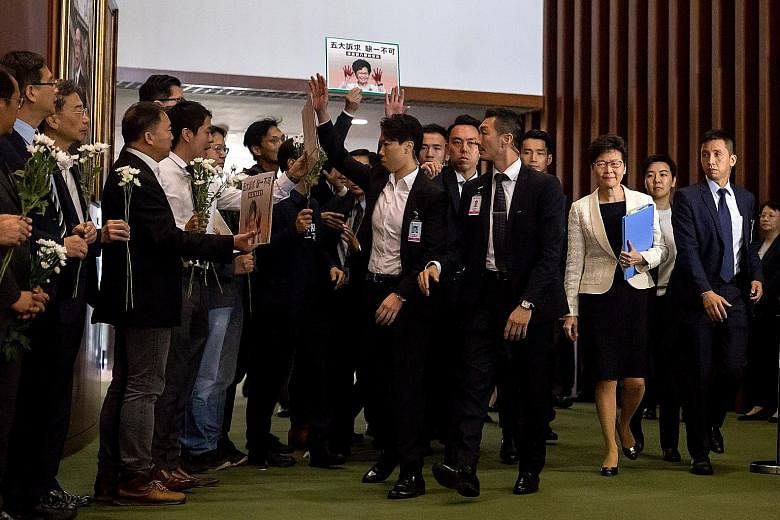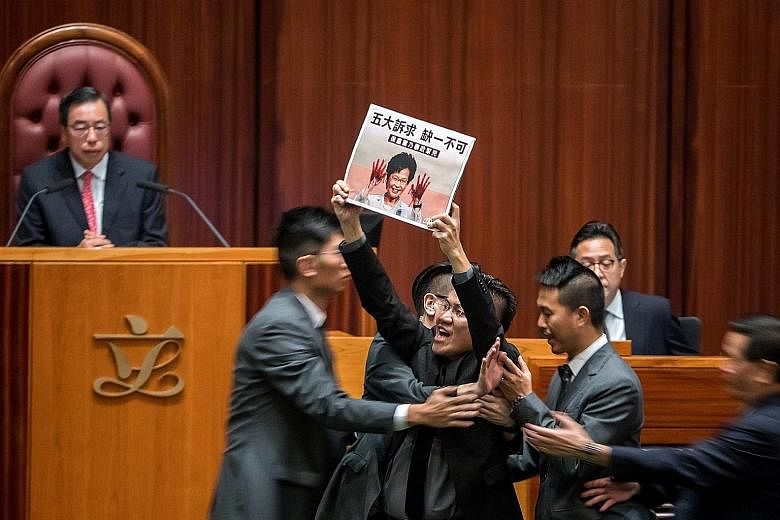HONG KONG • Hong Kong's legislature was interrupted for the second straight day as pro-democracy lawmakers shouted down Chief Executive Carrie Lam, a day after their protests forced her to deliver her annual policy address by video.
About a dozen opposition lawmakers were dragged from the city's Legislative Council by security staff for raising noisy objections yesterday.
The ejected legislators shouted at Mrs Lam and waved placards that showed the Chief Executive with blood on her hands, in reference to recent violent protests in the financial hub. The hecklers also demanded an inquiry into Wednesday's brutal attack on prominent human rights activist Jimmy Sham.
The body's president suspended the session, but opposition lawmakers continued their disruptions, before more of the 24 elected pro-democracy lawmakers were pulled out and the meeting suspended for a second time.
The second day of turmoil underscores the political rift in the city, with no end in sight to more than four months of anti-government protests over concerns that Beijing is eroding freedoms granted when Britain handed the city back to China in 1997.
"Regarding the current situation we are facing, we need to be united against violence, say no to violence," Mrs Lam said in the chamber, and again defended her efforts to end the crisis.
"I have mentioned that we will be humble, listen to different voices and set up an expert commission to find a way out of the current situation we are facing," she said.
The pro-democracy bloc in the legislature comprises only about a third of the lawmakers, but the displays this week showed they have the ability to delay or even shut down debate on major economic initiatives, even if they do not have the votes. That spells even more trouble ahead for an economy sliding into recession as protests against Beijing's grip over the city grow increasingly violent.
A day earlier, agitating lawmakers used a projector to shine the protest slogan, "Five demands, not one less", onto Mrs Lam's face, with Mrs Lam repeatedly pausing as she tried to deliver her policy address in the Legislative Council. Finally, she gave up and delivered her address, which normally details economic priorities, via video instead.
"If she fails to respond to the five demands, it would be a fantasy to expect normal business to resume in the Legislative Council," said Mr Alvin Yeung, a pro-democracy lawmaker who participated in the disruption, on Wednesday.
In her address, Mrs Lam pledged to make housing more affordable and promised cash handouts for students, many of whom have been on the front lines of demonstrations that have spurred regular clashes with police. They were among more than 200 initiatives aimed at easing some of the discontent that has fuelled the protests.
But she will have a hard time implementing them as well as a US$2.4 billion (S$3.3 billion) stimulus package announced in August without the support of lawmakers.
More than 50 legislative proposals are currently awaiting action, according to an Oct 16 meeting agenda. While some deal with mundane administrative issues - fees on karaoke parlours and bus-route schedules - others include deli-berations on a face-mask ban implemented under an emergency law and the official withdrawal of the extradition Bill that sparked the protests.
Pro-establishment lawmaker Regina Ip said it was still possible to push things through despite the "disgraceful" interruption by opposition lawmakers on Wednesday.
Certain measures announced in the policy address that do not require new funding - including relaxed mortgage rules for first-time home buyers and land requisition for new housing - could be implemented without lawmaker approval, she said.
BLOOMBERG, REUTERS
What passing of Hong Kong legislation by US House means
HONG KONG • The US House of Representatives has unanimously passed three pieces of legislation supporting the pro-democracy protests that have engulfed Hong Kong for more than four months.
The Hong Kong Human Rights and Democracy Act, the most consequential of the Bills, would put the former British colony's special treatment by the United States under tighter scrutiny.
The Protect Hong Kong Act, also passed on Tuesday, seeks to block the sale to Hong Kong of tear gas and other crowd-control items, while a non-binding resolution condemns Beijing's "interference" in Hong Kong affairs.
WHAT IS NEXT?
For the two Acts to become law, they must pass votes in the Senate, and then be signed by President Donald Trump.
Senator Jim Risch, Republican chairman of the US Senate Foreign Relations Committee, said on Wednesday that he hoped the Bills would move shortly. An aide said a vote could come as soon as next week.
HOW BIG A DEAL IS IT?
The new Hong Kong Human Rights and Democracy Act is seen as a largely symbolic amendment, but it could potentially alter the nature of relations between the US and Hong Kong. It could also exacerbate tensions between Washington and Beijing.
On Wednesday, China's Foreign Ministry accused US lawmakers of "sinister intentions" to undermine Hong Kong's stability and warned that bilateral relations would be damaged should the measures become law.
Beijing promised Hong Kong a "high degree of autonomy" for 50 years when it regained sovereignty over the city in 1997, but protesters say freedoms have been steadily eroded.
The new Act is an amendment to a 1992 law that has underpinned US relations with Hong Kong, affording the territory special status as separate from China - in trade, transport and other areas.
Under the 1992 law, the US president can issue an executive order suspending elements of Hong Kong's special status if the president determines that the territory is "not sufficiently autonomous" from Beijing.
The new Act requires the US secretary of state to annually certify to Congress whether Hong Kong "is sufficiently autonomous to justify special treatment by the United States... including the degree to which Hong Kong's autonomy has been eroded due to actions taken by the government of China".
If the secretary of state deems Hong Kong insufficiently autonomous, that could give the president ammunition for suspending any US laws that set Hong Kong apart, leaving it subject to the same rules that apply to the rest of China.
WHAT EFFECT MIGHT THE NEW LAW HAVE?
From a business perspective, one of the most important elements of Hong Kong's special status has been the fact that it is considered a separate Customs and trading zone from China.
That has meant, for instance, that trade war tariffs do not apply to exports from Hong Kong.
If Hong Kong becomes just another Chinese port, companies that rely on it as a middleman or for trans-shipping are likely to take their business elsewhere.
Trade between Hong Kong and the US was estimated to be US$67.3 billion (S$92 billion) last year, with the US running a US$33.8 billion surplus - its biggest with any country or territory, according to the Office of the US Trade Representative.
The American Chamber of Commerce in Hong Kong has said that any action to change the status of Hong Kong "would have a chilling effect not only on US trade and investment in Hong Kong, but would send negative signals internationally about Hong Kong's trusted position in the global economy".
REUTERS











